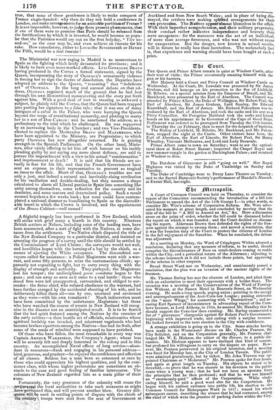A frightful tragedy has been performed in New Zealand, which
will strike with grief many a hearth in this country. Nineteen British settlers at Nelson, including some of the leading men, have been massacred, after a sort of fight with the Natives, at some dis- tance from the settlement. Two Native chiefs disputed the title of the New Zealand Company to a particular district, and insisted on arresting the progress of a survey until the title should be settled by the Commissioner of Land Claims : the surveyors would not wait, and hostilities began with the burning of a hut by the chiefs, as a means of ejecting the White occupants. The discomfited sur- veyors called for assistance : a Police Magistrate went with a war- rant, and some fifty persons, to seize the contumacious chiefs ; ap- parently not expecting to fight, but to carry every thing with the display of strength and authority. They parleyed; the Magistrate lost his temper; the undisciplined posse comitatus began to fire guns; - and ran away as soon as it came to a real battle : those who stood firm were left unsupported, surrounded, and obliged to sur- render: the fierce chief, who refused obedience to the warrant, had been further enraged by the accidental shooting of his wife, and he deliberately killed them all—one by one, unarmed and environed as they were—with his own tomahawk ! Much indiscretion must have been committed by the unfortunate Magistrate : but those who have watched the course of events in New Zealand will recog- nize in the disaster not an unanticipated result. It is to be feared that the bad spirit fostered among the Natives by the enemies of the early settlers—a then hostile set of officials, missionaries whose spiritual lordship was invaded, and miscreant vagabonds who had become lawless squatters among the Natives—has had its fruit, after some of the seeds of mischief were supposed to have perished.
Of those who have fallen, the most remarkable in every way was Captain ARTHUR WAKEFIELD, the Company's Agent ; whose loss will be severely felt and deeply lamented in the colony and in this country. An accomplished Naval officer of long service—abun- dant in resources—frank and engaging in his personal address— kind, generous, and prudent—he enjoyed the confidence and affection of all classes. Seldom has a man been so esteemed at once by those who could appreciate his highest qualities, and by the com- moner class, with whom higher pretensions are sometimes an ob- stacle to the ease and good feeling of familiar intercourse. The colonists of New Zealand regarded him as a main pillar of their state.
Fortunately, the very greatness of the calamity will rouse the tleiNgl the local authorities to take such measures as might ted this, and will prevent another blow. Greater dili- used in settling points of dispute with the chiefs of troops were sent from the seat of Government at Auckland and from New South Wales ; and in place of being dis- mayed, the settlers were making spIrked arrangements for their own protection. TheNatives apessiShaoat blameless in the affair. With their imperfect eomprehenmon, end-their military propensity, their conduct rather indicates independence and bravery than mere savageness : for the massacre was the act of an individual, of more than average fierceness, and who was not without cause for exasperation. But the danger, now known in actual results, will in future be really less than heretofore. The melancholy fact is, that experience and warning should have been bought at such a price.


























 Previous page
Previous page